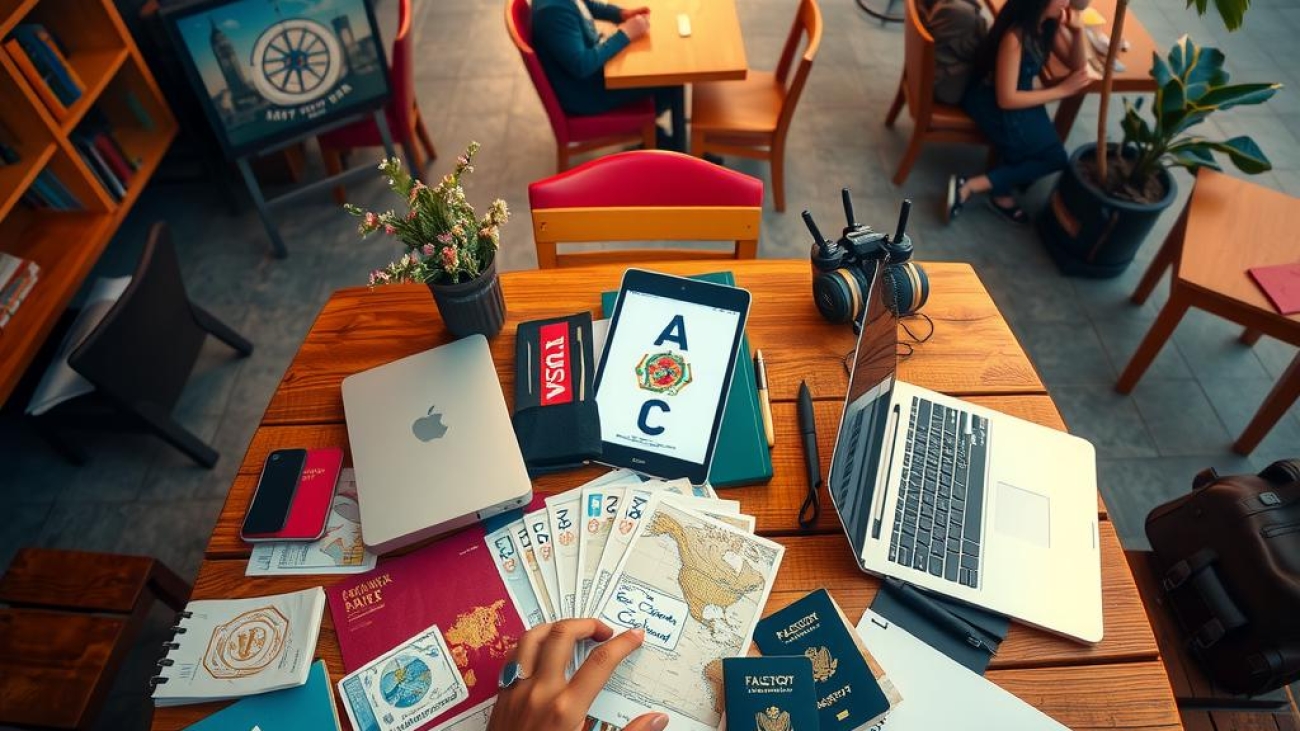In an era where remote work is becoming increasingly mainstream, the allure of a digital nomad lifestyle has never been more compelling. However, aspiring digital nomads often face a significant hurdle: understanding the intricate visa requirements set forth by various countries. With immigration policies varying widely from one nation to another, navigating these regulations can be daunting for those wishing to blend travel with work. What if there was a way to simplify this complex landscape? This blog post aims to provide readers with an in-depth comparison of digital nomad visa requirements across different countries, offering insights that can facilitate international relocation and seamless transitions between locations.
As individuals explore options for living and working abroad, they may find themselves overwhelmed by the variety of available programs tailored specifically for remote workers. From short-term opportunities to long-term travel residency permits, each country’s approach offers distinct advantages and challenges. By comparing these policies side-by-side, this article seeks to arm potential travelers with the knowledge necessary to make informed decisions about their next adventure.
The core value of this exploration lies not only in presenting factual information but also in equipping future digital nomads with actionable insights into how they can legally reside and work while enjoying new cultures around the globe. Whether interested in sunny beaches or bustling urban centers, understanding specific visa requirements will be crucial for anyone looking to embrace this flexible way of life fully.
Join us as we delve into key aspects such as application processes, required documentation, duration of stay allowed under each program, and additional perks offered by various nations vying for remote talent. Readers will discover which destinations align best with their professional goals while providing enriching experiences that complement their personal journeys—all through the lens of comprehensive country comparisons related to the ever-evolving world of digital nomad visas.

Key Points:
- Title of the point: A brief description of the word ‘Key Points’
-
Understanding Visa Requirements for Digital Nomads: The concept of a digital nomad visa has gained traction as various countries adapt their immigration policies to attract remote workers. Each nation presents unique visa requirements, making it essential for individuals to familiarize themselves with specific application processes, documentation needed, and any income thresholds that may apply. For instance, some countries might require proof of employment or a minimum salary level, which can significantly impact one’s choice in pursuing international relocation.
-
Country Comparison on Remote Work Visas: This article offers a detailed analysis through a comprehensive country-by-country comparison that highlights how different nations approach the issuance of remote work visas. By assessing factors such as duration of stay allowed under each type of visa and potential pathways to residency, aspiring digital nomads can make informed decisions about where they wish to base their next adventure. Some destinations are particularly appealing due to flexibility in their rules regarding stays and renewals; hence understanding these nuances is crucial for navigating global mobility.
-
Cultural and Economic Considerations for Digital Nomads: Beyond just the technicalities related to visa applications lies an exploration into how local culture, cost of living, and available amenities play significant roles in shaping one’s experience as a digital nomad. Countries actively seeking out remote workers often provide vibrant communities conducive to networking and collaboration while also catering to diverse lifestyles—whether one thrives in bustling urban centers or seeks refuge in serene rural surroundings. Recognizing these elements alongside practical concerns like immigration policies ensures that individuals not only select a suitable destination but also enhance their overall living experience abroad.
By integrating insights on both practical aspects such as visa requirements along with lifestyle considerations, this guide serves as an indispensable resource for anyone eager to embark on their journey within the realm of digital nomadism while ensuring compliance with relevant travel residency regulations worldwide.

Understanding Digital Nomad Visas: A Comprehensive Overview
Bridging the Gap Between Work and Travel
The emergence of digital nomad visas represents a significant evolution in immigration policies, catering specifically to the needs of remote workers who wish to explore new cultures while maintaining their professional responsibilities. In recent years, countries across the globe have recognized the potential economic benefits of attracting these individuals, leading to a variety of innovative visa programs designed for those embracing a nomadic lifestyle. These visas not only allow travelers to legally reside in foreign nations but also facilitate international relocation by providing clear guidelines on eligibility and application processes.
One primary advantage of obtaining a digital nomad visa is that it often comes with relaxed requirements compared to traditional work visas. Applicants may need to demonstrate proof of employment or income rather than securing job offers from local companies. This flexibility has opened doors for many professionals seeking opportunities in countries that align with their personal and travel aspirations. For example, popular destinations such as Portugal, Estonia, and Barbados have developed specific regulations aimed at making it easier for digital nomads to stay longer while working remotely—thereby fostering vibrant expatriate communities.
When considering various options available worldwide, understanding country-specific policies becomes crucial for prospective applicants. The criteria can vary widely; some nations prioritize income thresholds or educational qualifications while others focus on health insurance coverage or tax obligations during one’s stay. An effective way for digital nomads to navigate these complexities is through comprehensive country comparisons which highlight essential aspects like processing times and fees associated with each program. Such comparative analyses enable individuals not only to choose suitable locales based on lifestyle preferences but also ensure compliance with diverse immigration standards.
Moreover, there are inherent benefits beyond legal residency when acquiring a remote work visa under this category; participants often enjoy enhanced networking opportunities within local tech ecosystems enriched by fellow expatriates sharing similar goals and experiences. Being part of an increasingly interconnected global workforce fosters collaboration among talent pools from different backgrounds—encouraging innovation across industries that thrive on diversity.
As digital transformation continues reshaping how people perceive traditional employment models, the importance placed upon mobility will likely persist into future discussions surrounding labor markets globally. Countries keenly aware of shifting paradigms are more inclined towards establishing favorable conditions conducive toward attracting long-term visitors who contribute economically without displacing resident populations—a balance critical in contemporary discourse over immigration policies.
In summary, embracing a digital nomad visa serves as both an enabler for personal adventure and professional growth; its relevance in today’s dynamic landscape cannot be overstated as more individuals opt out from conventional office settings yearning instead for experiences that broaden horizons—all while ensuring they fulfill career commitments along the way.
Understanding Visa Requirements for Digital Nomads
A Comprehensive Overview of Application Processes
The landscape of work is evolving, and as more individuals embrace the nomadic lifestyle, countries are increasingly offering tailored solutions such as the Digital Nomad Visa. This visa type allows remote workers to live in a foreign country while maintaining their employment with a company outside that nation. Each country presents its own set of visa requirements, which can significantly vary based on factors such as application processes, income thresholds, and duration of stay. For instance, nations like Portugal have simplified their application processes by providing online platforms where applicants can submit documents electronically, making it easier for digital nomads to transition smoothly into their new environments. In contrast, some countries may require more extensive paperwork or even an interview at a consulate.
When considering income thresholds for obtaining a Digital Nomad Visa, countries typically assess whether applicants can support themselves financially during their stay without tapping into local resources. For example, Croatia requires proof of monthly income exceeding €2,200 for solo travelers—an essential factor in ensuring that nomads contribute positively to local economies rather than becoming burdensome liabilities. Conversely, other nations might impose lower financial standards but introduce additional requirements such as health insurance coverage or specific job contracts tied to international companies.
Moreover, the duration of stay permitted under these visas varies widely across borders; some offer short-term residence options lasting only six months while others allow stays up to two years with potential renewals thereafter. Countries like Estonia promote long-term engagement by permitting stays up to one year with flexible extensions available based on ongoing compliance with immigration policies.
As digital nomads navigate through various immigration landscapes worldwide, understanding these nuances becomes critical not just from an administrative standpoint but also in cultivating a fulfilling travel experience that aligns seamlessly with one’s professional life abroad. The diverse nature of each country’s offerings highlights the importance of conducting thorough research before applying for any remote work visa or residency program designed specifically for those who refuse traditional office constraints.
Comparing Country-Specific Procedures
Key Considerations When Choosing Your Destination
In addition to individual visa requirements, prospective digital nomads must consider how procedural differences impact overall relocation experiences across various destinations offering the Digital Nomad Visa option. Some nations streamline procedures significantly compared to others; this makes it crucial not just merely assessing eligibility but evaluating convenience associated with applications too—a detail often overlooked yet vital when planning relocations internationally.
For instance, Spain’s relatively recent introduction of its own version poses unique challenges due primarily due bureaucratic complexities surrounding documentation verification—often resulting delays extending timelines longer than anticipated—which could hinder ambitious professionals eager kickstart new chapters overseas promptly! Alternatively places like Georgia promote seamless transitions showcasing impressive turnaround times thanks efficient regulatory frameworks fostering quicker approvals —thus enabling smooth integration into vibrant local communities filled rich cultural diversity awaits exploration!
Furthermore examining global trends reveals emerging hotspots attracting burgeoning crowds seeking opportunities within rapidly developing tech sectors alongside breathtaking natural scenery suited adventurous spirits yearning balance between productivity leisure pursuits alike! Such comparisons empower savvy migrants make informed choices best aligned aspirations career goals whilst enjoying perks locations chosen enhance quality life enjoyed throughout respective journeys experienced therein—ultimately ensuring meaningful connections forged memories created amidst beautiful backdrops shared fellow wanderers traversing similar paths along way!
Ultimately understanding intricacies involved navigating complex world migration helps pave roads toward successful endeavors undertaken globally facilitating harmonious coexistence locals foreigners alike enhancing cross-cultural exchanges enriching lives profoundly both personally professionally through collaborative efforts nurtured friendships blossoming evermore vibrantly over time lasting legacies left behind generations future inspire continue thriving community spirit uniting all those seek adventure together!
Understanding Cultural Influences on Destination Choice
The Role of Culture in the Digital Nomad Experience
When aspiring digital nomads embark on their journey to find the perfect destination, cultural influences play a significant role in shaping their decision. Each country presents a unique tapestry of traditions, languages, and social norms that can greatly enhance or detract from the overall experience of remote work. For instance, countries with rich artistic communities and vibrant histories often attract creatives seeking inspiration. Additionally, understanding local customs and etiquette can ease integration into new environments, allowing digital nomads to foster relationships more easily with locals. Furthermore, many nations have adapted immigration policies to cater specifically to this demographic through offerings like the Digital Nomad Visa, which allows individuals to live and work remotely while indulging in local culture without facing complex visa requirements typically associated with long-term stays. This aspect not only simplifies logistics but also enriches one’s lifestyle as they navigate different cultural landscapes.
Cost of Living: A Practical Consideration
Balancing Lifestyle Choices with Financial Realities
Cost considerations are paramount when determining where to settle temporarily as a digital nomad. Countries known for lower living expenses—like Thailand or Portugal—are particularly appealing since they allow for an enhanced quality of life while maintaining financial stability through remote work opportunities. The cost structures vary significantly across regions; housing prices may differ drastically between urban centers and rural areas within the same country. Consequently, aspiring digital nomads must weigh these factors carefully alongside available amenities such as coworking spaces, reliable internet service providers, and social hubs that foster community engagement among fellow freelancers or entrepreneurs. Many countries now offer specific Digital Nomad Visas that not only facilitate legal residency but also provide insights into necessary income levels required for sustaining oneself amidst these varying costs—a crucial consideration when planning international relocation.
Amenities That Enhance Productivity
Finding Your Community Abroad
The availability of amenities plays a critical role in optimizing productivity for those who embrace a nomadic lifestyle. Access to reliable internet connections is non-negotiable; however, equally important are supportive environments conducive to creativity and collaboration found within coworking spaces or cafes frequented by other digital professionals. Cities like Berlin or Bali have emerged as hotspots due largely to their robust infrastructure catering specifically toward remote workers—from networking events designed for skill sharing among peers to wellness facilities aimed at achieving work-life balance amid demanding schedules. Moreover, nations offering favorable Digital Nomad Visas often highlight such resources within their promotional material aimed at attracting international talent willing not just to visit but invest time building community ties locally while contributing economically through freelance endeavors.
Immigration Policies: Navigating Legal Frameworks
Simplifying International Relocation Processes
Navigating immigration policies is crucial for anyone contemplating long-term travel abroad while working remotely—the complexities involved can deter even seasoned travelers from pursuing their dreams fully if left unaddressed properly upfront! Fortunately today’s global landscape increasingly sees many governments recognizing this trend towards remote employment by implementing streamlined processes geared toward attracting foreign professionals via specialized visas tailored just for them! These initiatives include incentives like reduced bureaucratic hurdles accompanying applications alongside clarifications regarding tax obligations during stays abroad—which ultimately fosters smoother transitions into new cultures without excessive stressors related strictly around paperwork issues alone! By taking advantage of options such as the Digital Nomad Visa, individuals gain access not only legally but socially too—ensuring richer experiences await adventurers eager enough explore beyond borders whilst still fulfilling commitments back home seamlessly along way!
FAQ:
Q: What is a digital nomad visa?
A: A digital nomad visa is a special type of permit that allows remote workers to legally live and work in a foreign country while maintaining their employment with an organization that may not be based in that country.
Q: How do I find the digital nomad visa requirements for different countries?
A: To explore the digital nomad visa requirements, individuals can refer to comprehensive guides or resources dedicated to immigration policies specific to each nation. These resources typically break down application procedures, income thresholds, and duration of stay.
Q: Can I apply for multiple digital nomad visas at once?
A: Generally, applicants should focus on one country’s digital nomad visa at a time. However, some individuals might explore options across different nations sequentially after fulfilling the conditions set by each country’s immigration policies.
In recent years, as professionals increasingly seek flexible working arrangements outside traditional office spaces, many countries have introduced specific digital nomad visas. This trend reflects an understanding of how attracting remote workers can boost local economies. Each nation’s approach varies widely; thus it’s essential for potential applicants to familiarize themselves with distinct visa requirements before embarking on their international relocation journey.
For example, one popular destination for digital nomads is Portugal. The Portuguese government has crafted its own version of a remote work visa, which facilitates easier access for those looking to immerse themselves in vibrant cultures while continuing their careers remotely. Applicants must meet certain income thresholds and provide proof of employment—key elements highlighted in our comprehensive country comparison guide covering various nations’ immigration policies.
Similarly, other countries such as Estonia have embraced this movement by offering unique opportunities through programs like the Estonian Digital Nomad Visa. This initiative caters specifically to remote workers who wish to stay longer than typical tourist durations while contributing positively to local economies through their presence and spending habits. Understanding these specifics helps aspiring digital nomads navigate complex processes more effectively when evaluating where they want to base themselves next.
Moreover, factors such as cost of living and available amenities play crucial roles in choosing an ideal location for one’s lifestyle preferences within the realm of being a digital wanderer. Countries vary significantly regarding what they offer—from bustling urban environments filled with coworking spaces perfect for collaboration—to serene rural settings conducive for focused work periods away from distractions yet still rich in culture and natural beauty.
Ultimately, thoroughly researching various nations’ tailored solutions provides future travelers with insights into how they can maintain their professional endeavors abroad without compromising personal fulfillment or adventure-seeking aspirations inherent within any true nomadic lifestyle. By demystifying the nuances related specifically towards obtaining these coveted remote work visas, individuals are better equipped not only logistically but also emotionally as they embark upon this exciting chapter along their career paths globally.
